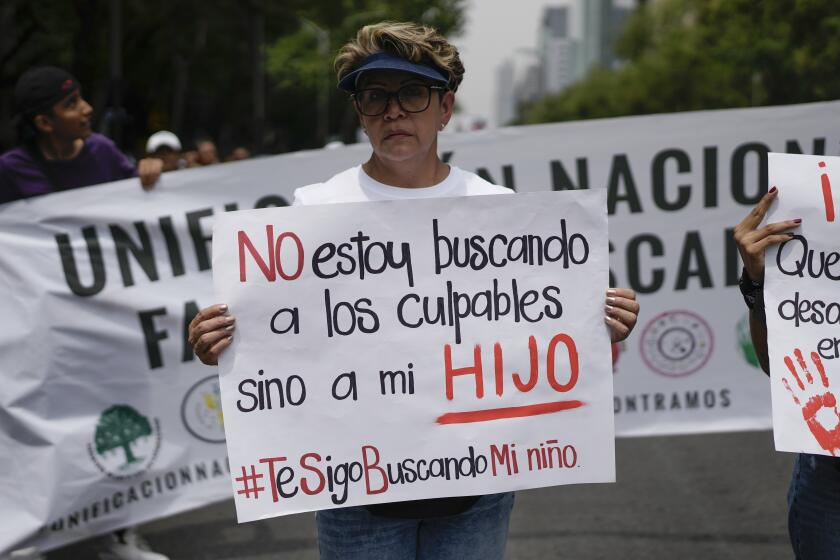Snuffing Out Tobacco Is No Easy Task for Maryland Farmers
Tobacco farmer Leonard “Buddy” Rice quit smoking cigarettes 20 years ago. But he says it is going to be a lot harder to kick the habit of growing the golden weed.
But quit he will--with help from a couple of improbable sources. Come spring, as he brings his final harvest of tobacco to auction, Rice expects to receive a check paying him as much as $20,000 to stop growing the crop he has raised--or helped to raise--since he was 4 years old. It would be the first of 10 yearly payments that would help ease Rice, and as many as 1,100 other Maryland farmers, out of the tobacco business.
The money comes from the $206-billion tobacco settlement reached in late 1998 between the nation’s largest tobacco companies and the 50 states. It will be funneled through the state of Maryland, whose governor, Parris N. Glendening, vowed last January to use part of its share of the windfall to close the book on “Maryland’s history as a tobacco state.” Over a decade, Maryland plans to use $83 million of its $4 billion in expected settlement proceeds to pay farmers like Rice to substitute other crops for tobacco.
Maryland’s plan to convert a crop with state roots that date back to the 17th century is unique. Across the nation, states are planning to use their tobacco-settlement money for a broad range of programs, from anti-smoking campaigns and health-insurance expansion to bridge- and road-building and property tax relief.
In Ohio, legislators have decided to use some of the funds for law enforcement. North Dakota earmarked some of its tobacco money for flood-control projects, according to a recent report by the National Assn. of State Legislatures.
None but Maryland, however, has sought to drive tobacco cultivation out of existence entirely and to ease an entire class of farmers into new crops. As a result, some economic planners see its program as a national model of economic conversion. If it works here, said J. Philip Gottwals, an economic development consultant to the Maryland effort, it should provide lessons for other communities facing the collapse of their economic mainstays, whether shuttered military bases, court-ordered bans on logging or collapsed fisheries.
“People are interested to see if we can pull this off,” Gottwals said. “It will definitely be a case study.”
A mere 10 miles from Rice’s farm--across the Potomac River in the Commonwealth of Virginia--tobacco farmers are getting checks from the tobacco settlement too. But theirs come without strings attached--a way to compensate them for worsening market conditions. Carthan Currin III, the Virginia governor’s appointee overseeing the state’s tobacco settlement money, recently called tobacco farming “a valuable mainstay and an honorable way to make a living.” Virginia is spending all of its first-year allotment of tobacco settlement money--$84 million--on tobacco farmers and their communities, and has set aside half of the money it will receive over 25 years for this group.
But at Rice’s farm and others in southern Maryland, planning an exit strategy is the order of the day. Last week, as the 71-year-old Rice and his son Michael began harvesting their 10 acres of “bacco,” both were contemplating what, over the next 10 years, they will grow in the sultry stillness of their farm.
With an average age near 65, Maryland’s tobacco farmers have been around long enough to see that the tobacco industry in the state is dying. Their embrace of the wholesale buyout has been eager, if sad.
But they are also old enough to make what is likely to be a wrenching transition difficult. And the subject of what comes next remains a mystery to people like Rice. Researchers have suggested that the land could be used to raise goats for the East Coast’s growing Muslim population, specialty vegetables like bok choi for Asian American markets, hothouse raspberries or even grapes for East Coast wineries.
Anything, according to state planners, but mansions and townhouses, which are sprouting like weeds in an untended garden in this fast-growing region barely an hour’s drive from Washington, D.C. Farming, since its inception a pillar of the southern Maryland economy, must remain vibrant here, they say.
As a condition of accepting the tobacco buyout, Buddy Rice and his son would be obliged to keep their converted tobacco fields under cultivation for 10 years. But try as they might, they cannot imagine raising any of the exotic crops under discussion, and they do not know any alternatives that would pay as steadily, or as well, as tobacco.
In southern Maryland, tobacco generates 70% of farmers’ incomes, even though it occupies only 5% of the acres under cultivation. Scattered on small plots on almost every farm, the crop is a laborious, year-round occupation--one of the reasons in labor-strapped southern Maryland why it is not a bigger crop.
But “even on a small plot, you could always make a right-good living,” said Elois Rice, Buddy Rice’s wife. In recent years, as corn and soybean prices have sunk, tobacco is the only crop that has brought in much money. And it does so in the spring, just when seeds for other crops must be purchased.
As a result, the alternatives look pretty unappealing.
“I don’t like goats,” said 34-year-old Michael, grimacing with distaste. Hothouse raspberries would require the Rices to build costly new structures. And wine grapes would take some seven seasons to establish themselves--seven years of hard work and uncertainty at a time when, for the elder Rice, retirement should loom.
“I don’t mind changin’. Everybody’s got to change,” said Buddy Rice. He just hopes that the tobacco companies--he believes that they hooked him both on smoking and growing their product--survive long enough to pay the money they promised in the settlement.
Next to the Rices’ fully mature crop of tobacco leaves, glowing golden-green in the shimmering heat, neat rows of soybeans stretch out to the tree line and down to the Wicomico River. Like many tobacco farmers, Rice is thinking that he might expand one of his existing crops, like this one. Economic planners like Gottwals say that “value-added” industries like processing plants, which can turn specialty soybeans into finished products, may be one way to replace tobacco’s golden grip on the region.
For Rice, the final tobacco harvest is bittersweet. But that is appropriate, he said, for a crop that has been good to him--and bad for him--virtually all his life.
“We’re sort of between a rock and a hard place,” said Rice, who gave away his last four cartons of Winstons at Christmas in 1980.
“I’ve grown tobacco for a living because I had to make a living out of something. But I do feel very strongly that smoking’s not good for anyone. Regardless of what goes on, we are gonna have to find something other than tobacco to make a living out of.”
More to Read
Start your day right
Sign up for Essential California for news, features and recommendations from the L.A. Times and beyond in your inbox six days a week.
You may occasionally receive promotional content from the Los Angeles Times.







